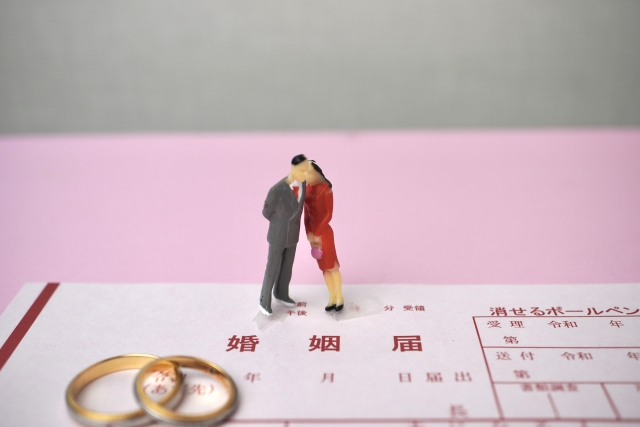I’m Takashi Akeyama, a representative of the Niseko VISA & Immigration Support Centre. As the only Administrative scrivener(行政書士) office in Hokkaido specializing in VISA & Immigration and tourism, we help foreigners living in Hokkaido, mainly in Niseko, Otaru and Sapporo areas, to apply new or extend VISA, to change the status, such as working visa and spouse visa etc.
In this article, I will explain who can obtain a spouse visa.
- Who can obtain a “Spouse or Child of Japanese visa?
- Condition 1: Marriage procedures must have been completed in Japan and the foreigner’s country of origin.
- Condition 2: The applicant must be able to prove that they are actually married as a couple.
- Condition 3: The couple must have sufficient income to maintain their married life in Japan.
- In conclusion
Who can obtain a “Spouse or Child of Japanese visa?
According to the website of Immigration Office in Japan, those who can obtain a “Spouse or Child of Japanese visa are,
①The foreigner is the spouse (=husband or wife) of a Japanese.
②The foreigner is the natural or specially adopted child of a Japanese.
In this article, I will provide detailed information on ①, the foreigner is the spouse of a Japanese.
Condition 1: Marriage procedures must have been completed in Japan and the foreigner’s country of origin.
The first and most important condition is that official marriage procedures have been completed in both Japan and the foreigner’s country of origin, and that the couple is legally married. This does not apply to so-called common-law relationships or de facto couples who have not gone through any marriage procedures. Even if they have lived together for a long period of time and have children together and appear to be married on the outside, this is not a condition for applying for a spouse visa, unless a legal marriage relationship has been established.
As for the completion of marriage procedures in both Japan and the foreign country, in the ‘Application for Certificate of Eligibility’ or ‘Application for Permission for Change of Status of Residence’, there is a column for entering the ‘place of marriage notification’ and the ‘date of notification’ for each country. As evidence, an official ‘marriage certificate’ issued by the foreigner’s country of nationality must be submitted.
In some countries, this marriage certificate is issued only once in a lifetime and is not reissued. Care must be taken not to lose it. In addition, a copy of the family register (certificate of all matters) is submitted as proof of whether the marriage has been registered in Japan. The ‘Date of Marriage’, ‘Spouse’s Name’, ‘Nationality’ and ‘Date of Birth’ of the foreign national will be entered in the ‘Status Matters’ section of this certificate. In this way, the entry on the application form, the foreigner’s marriage certificate and the Japanese national’s Certificate of All Matters of the Family Register prove that the official marriage procedure has been completed.
Condition 2: The applicant must be able to prove that they are actually married as a couple.
A spouse visa cannot be granted merely on the basis of a legal marital relationship. The purpose of the spouse visa is to live as a married couple in Japan, so unless you can prove that you already have an actual relationship as a married couple, you will not be granted a spouse visa. The substance of their relationship as husband and wife is difficult to prove in official documents. In the ‘Questionnaire’, the Immigration Office tries to ascertain the actual status of the couple more accurately by asking them to explain the following.
(1) The circumstances that led to the marriage.
・When and where they first met.
・The circumstances from the first time they met until the marriage was registered.
(2) Whether or not they have an introducer.
・If there is an introducer, details of that person and his/her relationship with the Japanese or foreigner respectively.
(3) Languages used in conversations between the couple.
∙ Each other’s mother tongue and the level of understanding each has of the other.
・If the foreigner can speak Japanese, a specific explanation of how he/she learned Japanese.
(4) Whether the wedding ceremony was conducted.
・The date and place of the wedding, who attended on both sides, and the total number of people present.
(5) How many times the foreigner has visited Japan before.
・The date of entry and exit from the country and the purpose of the visit.
(6) How many times the Japanese has been to the foreigner ‘s country
・List before and after marriage separately.
・State when (date and time) you entered and left the country and the number of times you travelled.
It is assumed that these questions are used to determine whether the couple is a formal couple who were merely introduced, mechanically made a combination, and completed the marriage procedure without knowing each other. For this purpose, how did they meet, what was the process up to the registration procedure and how was the communication between them during this period? And the conduct of the wedding ceremony, which was celebrated by their parents, relatives and friends. And that there is a track record of travelling between each other’s countries, and that relationships have been established through direct face-to-face interaction. By specifically confirming these things through the statements in the questionnaire, it seems that the credibility of the couple as a married couple is being confirmed. In addition to explaining these in writing in the questionnaire, they are also required to provide documentary evidence of this statement.
The website of Immigration office lists ‘snapshots’ of the two of them together, social networking records, phone records, etc., as ‘documents that can confirm their interaction as a couple’. With regard to photographs, given the content of the questionnaire, it is obviously better to have photographs not only of the two of you together, but also of each other’s parents, relatives and friends, as well as wedding photographs. With regard to social networking and call logs, they are important sources of evidence to show the level of communication in each other’s language. In order to prove the continuity of the couple’s relationship, it is also recommended to provide some regular minutes (depending on the length of the period, but approximately once or twice a month) between the time they met and the visa application, in order to show that they have been communicating regularly.
Condition 3: The couple must have sufficient income to maintain their married life in Japan.
Even if you have been successful in obtaining a spouse visa, if you do not have the income and financial basis to live as a couple, you will be financially impoverished, and your married life will break down. If the couple’s life as a couple breaks down, there is no point in having obtained a spouse visa. To avoid such a situation, the following documents are required to be submitted as evidence when applying for a visa.
①Certificate of taxation (or tax exemption) and certificate of tax payment for the most recent year of the person paying for the applicant’s stay.
→This must show both gross income and tax payment status for the year.
②If the taxation/tax payment certificate cannot be submitted, a copy of the bankbook, a certificate of expected employment or a letter of offer of employment.
These documents prove whether the couple has enough income to support themselves. Even if there is no income at this stage, there must be enough in savings to sustain them until they can find regular work and earn an income. Alternatively, the couple must have already found a job after coming to Japan and be able to prove that they will be able to earn a certain income in the future. In this way, documents can be submitted as evidence that the couple has an income or is expected to have an income that will enable them to maintain their married life together.
In conclusion
This article has explained the three conditions for those who can obtain a spouse visa.
★Condition 1: Marriage procedures must have been completed in Japan and the foreigner’s country of origin.
★Condition 2: The couple must be able to prove that they are actually married.
★Condition 3: The couple must have sufficient income to maintain their married life in Japan.
The three conditions must be proved concretely and objectively by submitting documentary evidence and materials. The spouse visa can be granted by proving that the couple is a real couple, with the authenticity, stability and continuity of the marriage being proven.
The Niseko VISA & Immigration Support Centre help and support foreign nationals who are trying to overcome language, cultural and custom barriers and live as a member of Japanese society. If you have any questions or enquiries about this article, or about the conditions or procedural aspects of applying for spouse of Japanese visa, please feel free to contact us by phone or via the ‘Free Consultation Form’ on our website.




